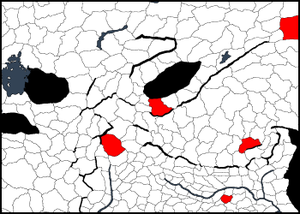无编辑摘要 |
|||
| 第1行: | 第1行: | ||
{{Version|2.8}} | {{Version|2.8}} | ||
''' 东方宗教''' 是王国风云2中的一个[[religion| 宗教组]] 。 | |||
[[ 印度宗教]] (也叫达摩宗教),是东方宗教下属的一个子宗教组。 | |||
东方宗教全部起源于南亚和东亚地区,并且彼此之间有相同的历史关联。 | |||
在拥有{{icon|roi}}''[[Rajas of India]]'' DLC 后,你可以扮演非游牧政体的本宗教组角色;{{icon|jd}}''[[Jade Dragon]]'' DLC 只是可以扮演道教角色。 | |||
== 特征 == | == 特征 == | ||
2019年3月4日 (一) 10:55的版本
东方宗教是王国风云2中的一个宗教组。
印度宗教(也叫达摩宗教),是东方宗教下属的一个子宗教组。
东方宗教全部起源于南亚和东亚地区,并且彼此之间有相同的历史关联。
在拥有![]() Rajas of India DLC后,你可以扮演非游牧政体的本宗教组角色;
Rajas of India DLC后,你可以扮演非游牧政体的本宗教组角色;![]() Jade Dragon DLC只是可以扮演道教角色。
Jade Dragon DLC只是可以扮演道教角色。
特征
印度宗教
印度宗教的详情请前往相关词条印度宗教查阅。
 道教
道教
Taoism is a religion and philosophy originating in China which is based on living in harmony with "the Way" (Tao or Dao). Its main theorician is Lao Zi, which left a strong impression over Kong Fuzi (better known as Confucius) and was later deified. Like him, many Chinese mythical figures have become Taoist saints or gods along with their close relatives. The main deities are Yuhuang Dadi, the Emperor of Jade which rules over destiny, Donghua Dijun, Lord of the Eastern Mountain and of afterlife and Xiwang Mu, Mother-Queen of the West and guardian of the peaches of Immortality, which grant an almost divine status to the virtuous and wise ones.
Taoist principles are naturalness, spontaneity, simplicity, detachment from desires, and most important of all, wu wei (i.e. "Doing nothing" = not occupying oneself with/not interfering in the affairs of others). The principle of balance (represented by the yin yang symbol) is also important.
In-game, Taoism is restricted by a lack of special casus belli. However, the stability offered by the absence of a short reign penalty should not be underestimated. With the +2 bonus for Stewardship, it is easier to have a large demesne and to receive more taxes. If your ruler has the Han culture in addition to the Taoist faith, he gets ![]() +2 Imperial grace every month towards the Chinese Emperor (if the Emperor is Han and Taoist, which he is over long periods of time) which can be spent on a multitude of useful features to improve the domain and strengthen the ruler. Getting a peace treaty and thus protection from Imperial invasion and military help through an Imperial marriage or Kow-tow is easy for a Taoist Han ruler.
+2 Imperial grace every month towards the Chinese Emperor (if the Emperor is Han and Taoist, which he is over long periods of time) which can be spent on a multitude of useful features to improve the domain and strengthen the ruler. Getting a peace treaty and thus protection from Imperial invasion and military help through an Imperial marriage or Kow-tow is easy for a Taoist Han ruler.
Overall, Taoism offers stability and the option to build tall, i.e. smaller but powerful realms, at the price of fewer offensive options.
Taoism has a unique name for Piety, Te.
Features:
- A combination of stability and economic power
- Ruler gets + 2 stewardship
- No "Short reign" penalty
- Can designate any valid offspring as heir
- Can take up to three concubines
- Holy sites: Jiuquan, Lhasa, Khotan, Gaya and Udabhanda
- Jiuquan: An outpost in the Hexi Corridor which near the Kongtong Mountains, one of the sacred mountains of Taoism (though in fact not so near, about 1000 km apart).
- Lhasa: Location of the Jokhang Temple, the most sacred and important temple in Tibet. Jokhang Temple is related to Songtsen Gampo's wife, Princess Wencheng of the Chinese Tang dynasty.
- Khotan: Location of the Kunlun Goddess, the highest mountain of the Kunlun Range. And Khotan is the main source of the nephrite jade used in ancient China.
- Gaya: This is where the Buddha is said to have reached enlightenment ,and according to a Taoist book called Hua Hu Ching(Classic on converting the barbarians) ,after leaving China to the West, Lao Zi had travelled as far as India, where he had converted—or even become—the Buddha.
- Udabhanda:Seems to be the place where the famous Taoist Qiu Chuji meet Genghis Khan.
- Lhasa, Khotan and Udabhanda are important

 Silk Road counties.
Silk Road counties.
- Lhasa, Khotan and Udabhanda are important
- Gets +2 Grace/month if Han, as long as Chinese Emperor is Han and Taoist (invasions can change that): better availability of wide variety of boosts from Emperor
- Can Intermarry with Buddhists, Böns, Manicheans, Zunists and Nestorians
- No Holy War CB or special CB
- No religious head and thus no Great Holy War mechanic
- No holy order
- Can choose a school of thought (out of 3 choices) when reaching 100 Te
- Zhengyi Dao, the Way of Orthodox Unity: National Revolt Risk -2%, Martial +1, Intrigue +1, Diplomacy -2.
- Quanzhen School of Complete Perfection: Build Cost -10%, Build Time -10%, Martial -2, Fertility - 25%, Health +1.
- Shangqing School of Supreme Clarity: Diplomacy +1, Stewardship -2, Learning +3.
道教概观
在游戏中,道教在地图上几乎不存在。唯一一个道教存在在地图上的剧本是769剧本, 此时汉人都护府仍然统治着酒泉公爵领, 而在867剧本辽帝国已经统治了蒙古王国.
在游戏中,中国是大部分,或者说几乎是所有道教角色的来源。当中国皇帝信仰道教时,通过皇恩互动找到一个道教廷臣并不困难,他们常常因为自己的服务而获得一个伯爵领作为奖励。
另一个道教统治者的来源则是许多来源于中国的雇佣兵。麒麟佣兵团和青龙佣兵团是远东地区最强大的雇佣兵,也能持续不断地生成道教指挥官,即便是当中国皇帝信仰佛教(在女真入侵之后, 或者在1066年)或者长生天(在蒙古入侵之后)。偶尔,他们会试着冲出他们的固有区域,其中的一些廷臣也可能会成为冒险家。
冒险家也是另一个道教角色甚至是道教统治者的重要来源。由于其临近中国,于阗王国和费尔干纳公爵领常常成为他们的主要目标。其中一些冒险家能够成功,并建立起自己的公国。
最后,一些事件也能产生道教角色。比如,中原王朝的某个反对者可能在一个统治者的宫廷中寻求庇护;或者当一个统治者遵循上谕进贡马匹作为朝贡之后,中国可能派遣一位商贸官员到统治者的国土上来。
